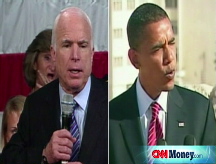Obama stocks, McCain stocks
A win for the Democrat could be good for alternative energy and bad for health care. A win for the Republican could be a boon for defense and bust for coal and ethanol firms.

NEW YORK (CNNMoney.com) -- Who would be better for the stock market: a President Obama or President McCain?
Well, the usual knee-jerk reaction on Wall Street is that Republicans are better for stocks than Democrats because Republicans tend to favor lower taxes for businesses and less government intervention in big business.
But that may no longer be the case, as the unprecedented steps taken by the Bush administration during the past month to try to save the banking sector clearly demonstrate that a heavy dose of federal regulation can also be a reality with a member of the GOP in the Oval Office.
So rather than simply try and figure out what the market as a whole might do as a result of what happens this Election Day, it might make more sense to try and identify specific companies that could benefit - as well as those that could suffer - during an Obama or McCain stint in the White House.
In fact, the research firm International Strategy and Investment (ISI) has done just that. Andy Laperriere, a managing director of ISI's policy research team in Washington, has put together a portfolio of 20 stocks for an Obama portfolio and 20 more for a McCain portfolio.
Here's a look at some of the more prominent companies and themes for both candidates.
Energy: If you've watched any of the presidential debates, you know that the two candidates have some pretty big differences regarding their energy policy.
With that in mind, Laperriere thinks that several alternative energy companies could do well under Obama, since it is likely that an Obama administration would push for more subsidies and mandates for alternative energy.
He identified three stocks in particular that could benefit: Covanta Holding (CVA), which produces energy from waste, solar energy leader First Solar (FSLR) and Danish wind turbine maker Vestas Wind Systems (VWSYF).
Laperriere also included four energy companies that investors could sell short (i.e. making a bet that the stock will go down) if Obama won: oil producers Exxon Mobil (XOM, Fortune 500) and Sunoco (SUN, Fortune 500), the rationale being that Obama has advocated a windfall profit tax for oil firms - and utilities Southern Co. (SO, Fortune 500) and Duke Energy (DUK, Fortune 500), the thought being restrictions on carbon emissions could hurt them.
As for McCain, Laperriere thinks that companies with exposure to nuclear energy could do well since McCain has consistently advocated nuclear as a viable alternative energy source, which could mean more incentives for new power plants.
Shaw Group (SGR, Fortune 500), a construction firm that provides consulting to nuclear power companies, and Exelon (EXC, Fortune 500), a utility with 10 nuclear power plants in Illinois, Pennsylvania and New Jersey, could both benefit from a McCain victory.
McCain also has come out in favor of so-called "clean coal" production. That could be bad news for traditional coal producers such as Peabody Energy (BTU, Fortune 500) and Consolidated Energy (CNX), which Laperriere has as short positions in the McCain portfolio. But it might be a boon for a company like Sasol (SSL), a South African leader in converting coal into liquid fuel.
Finally, food giant Archer Daniels Midland (ADM, Fortune 500) is a short in Laperriere's McCain portfolio, since McCain has been a big opponent of subsidies to agricultural firms for ethanol production from corn.
Health care: If McCain emerges victorious, that could be good news for drug makers such as Pfizer (PFE, Fortune 500) and Novartis (NVS), Laperriere argues, since McCain would probably be less likely to seek stricter curbs on drug prices.
Likewise, the decreased chance of a major overhaul of the health care system under McCain could also be a plus for managed care firms like Unitedhealth (UNH, Fortune 500), WellPoint (WLP, Fortune 500) and Aetna (AET, Fortune 500).
On the flip side, an Obama victory could lead to significant changes in Medicare. As such, Laperriere has two managed care companies with significant exposure to Medicare, Humana (HUM, Fortune 500) and HealthSpring (HS), as short positions in the Obama portfolio.
Laperriere also has insurance company ProAssurance (PRA), a leading provider of malpractice insurance, as a short position for the Obama portfolio, based on the notion that Obama would crack down more on high malpractice insurance costs and their effect on the overall health care industry.
Finance: Beaten down financials may have more to fear if Obama is elected, according to Laperriere's research.
He has student loan giant Sallie Mae (SLM, Fortune 500) as a short position due to thoughts that an Obama administration could seek an elimination of the Federal Family Education Loan program for student loans in favor of more direct loans from the government.
Credit card company Capital One Financial (COF, Fortune 500) is also a short in the Obama portfolio based on the notion that Obama might crack down more sharply on the industry for high fees and interest rates.
Finally, tax preparer H&R Block (HRB) is another short position in the Obama index, since Obama has proposed making it easier for taxpayers that file the EZ form to get faster returns from the IRS.
Laperriere has two financials as shorts in the McCain portfolio as well. One is Freddie Mac (FRE, Fortune 500) (although it's hard to imagine the stock heading much lower since it trades for less than a buck a share) since McCain might push to have Freddie and fellow mortgage financing giant Fannie Mae (FNM, Fortune 500) fully privatized.
The other short is life insurer Lincoln National (LNC, Fortune 500). Laperriere points out that Lincoln National and other insurers actually thrive if income and estate taxes are higher since customers buy these products for tax-protection purposes. So demand could wane if McCain is able to push through lower taxes, particularly for more wealthy individuals.
Industrial: With the economy slowing, Obama might be inclined to propose New Deal-esque projects to increase spending on infrastructure, such as highways and mass-transit. That, Laperriere posits, could provide a boost to construction firms Vulcan Materials (VMC), Granite Construction (GVA) and URS (URS, Fortune 500).
Speaking of transportation, Laperriere also includes struggling GM (GM, Fortune 500) as a stock to buy in the Obama portfolio, since he thinks an Obama administration would be more supportive of giving bigger loans and subsidies to Big Three automakers in order to protect jobs.
As for McCain, Laperriere believes defense firms could be big beneficiaries, particularly if McCain pledged to keep troops in Iraq for a longer period of time than Obama. He cites General Dynamics (GD, Fortune 500), Northrop Grumman (NOC, Fortune 500) and KBR (KBR, Fortune 500) as likely winners.
Finally, telecom giant Verizon could be a winner in a McCain administration, according to Laperriere. That's because McCain opposes "net neutrality" legislation that would make it tougher for Internet access providers such as Verizon (VZ, Fortune 500) to charge higher fees based on customers' Web usage.
Now, of course, a lot of what Laperriere is suggesting depends on far more than who wins the White House.
If Democrats gain more seats in Congress but McCain wins the presidency, there's an increased likelihood of gridlock, i.e. little in the way of substantive policy changes that will affect any major companies. And the same is obviously true if Obama wins and Republicans pick up more Senate and House seats.
But clearly, the results of the election will play a major role on what may happen to several big companies in 2009 and beyond. So it's not a bad idea for investors to start thinking of what those outcomes might be. ![]()






